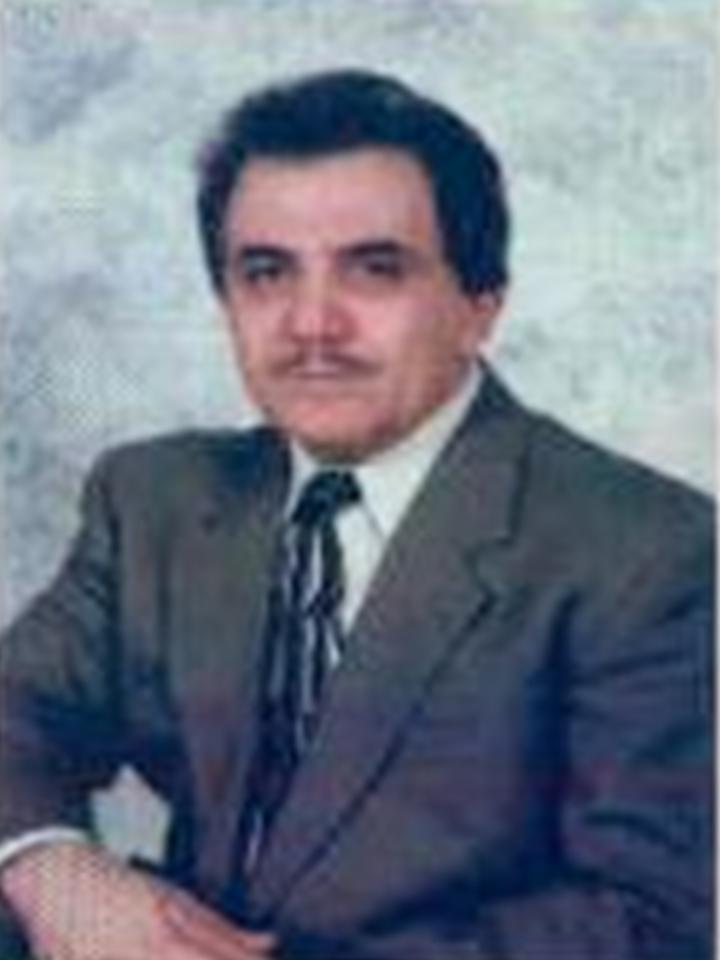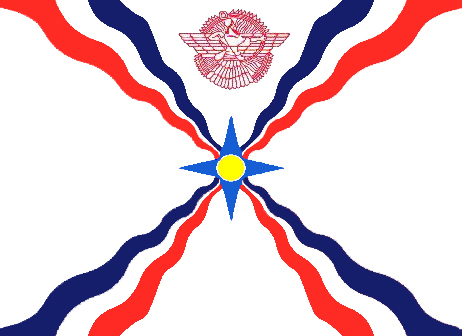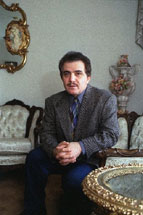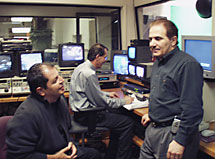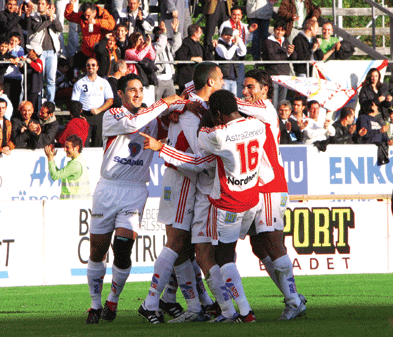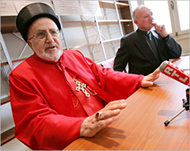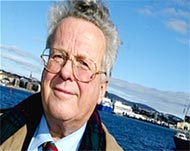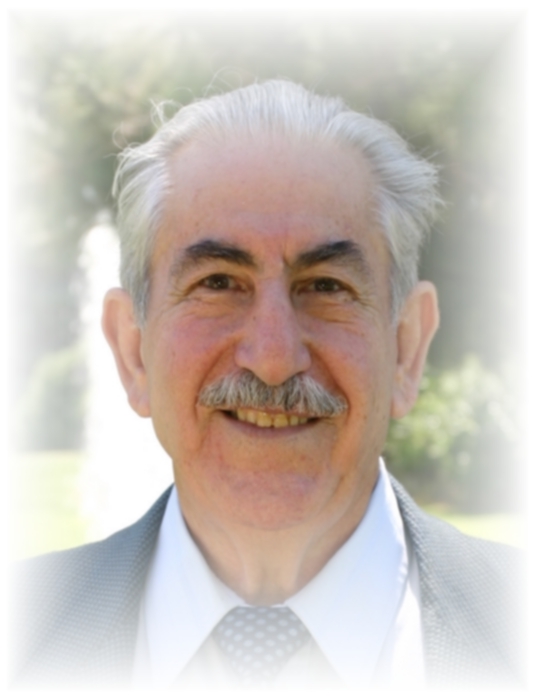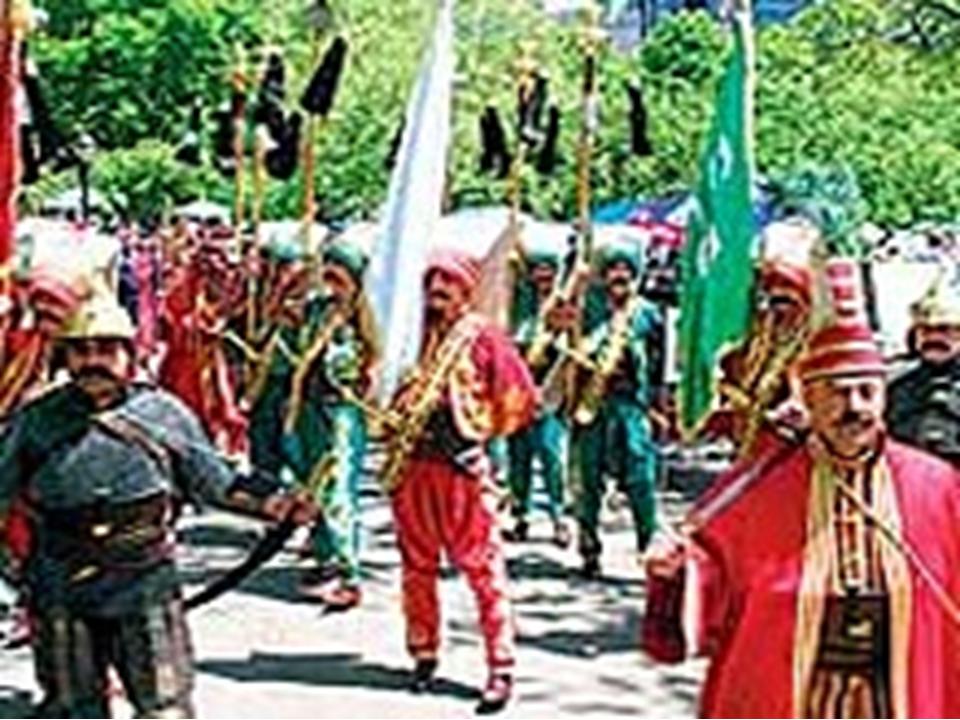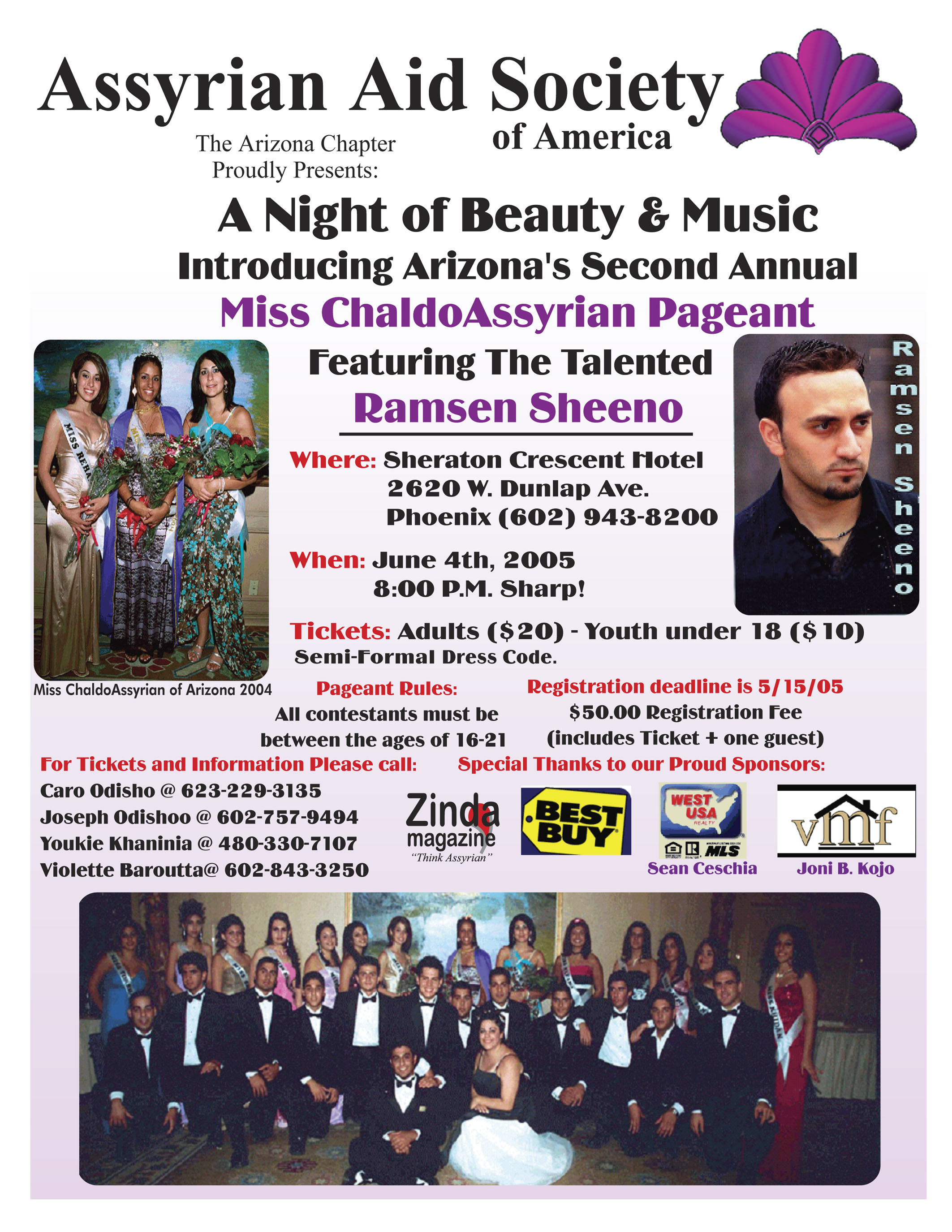An Overture without a Symphony
A Political Realm
"Whatever can be spoken or thought of necessarily 'is', since it is possible for it to be, but it is not possible for nothing to 'be'." [Parmenides].
Mr. George W. Bush, the U.S. President, inadvertently opted for that last part of the maxim, "it is not possible for nothing to 'be'."
A personal vendetta, a political riddance, a show of force, a mesmerizing spasm of chauvinism, and perhaps even an outlandish euphoria of dogmatically tantalizing Republican attitude in a response to Nine-Eleven tragedy, entrapped Mr. Bush's storm-trooper philosophy, thus, launching his war of liberation of Iraq, rather than the war on esoteric misconception, that is against the sources of the predators, or real perpetrators.
After a devastatingly tragic event of Nine-Eleven, any White House occupant would strike at any outpost accommodating partisans and ideologues of this heinous act. So the President of the U.S., like his predecessors, former Presidents, Reagan and Bush [father], had to hammer, in a strongest possible way, at any tinhorn disagreeing with his policies of revenge. Hence, just like his predecessors, that sent the Armed Forces to Grenada and Panama, President Bush dispatched the U.S. military might to remove the despot of Iraq.
The Gulf War of 1991, planned, instigated, and led by the U.S. Armed Forces, under the command of the 41st President of the United States, Mr. George Walker Bush, the father of Mr. George W. Bush, the 43rd President, was an 'Overture', or perhaps even an Intermezzo. It had the international support, and the territory of Iraq was prone for all the armies to march right through, all the way to Baghdad. Once there, the harsh regime of President Saddam Hussein would definitely fall, and a total democracy, perhaps, in the shade of the Middle Eastern philosophy, could be established.
But, Mr. Bush, the father, opted to stop short of deposing the dictatorship of Iraq, and recalled the more than one half million Americans, assembled there, back home.
Mr. Bush, the father, composed and conducteed an 'Overture Without the Symphony'.
The White House devising a policy of dichotomization, acted harshly and with the highest sense of perseverance, in subduing a nation, namely Iraq, to rubble and infamy, solely, for the latter's political anachronistic behavior.
Today's elucidation of Iraq conforming to the rule of the civilized world is a total misconception, a wrenched misdeed and an unabashed smoke screen.
 |
ANTIQUARIAN ARCHAEOLOGY & SYRIAC BOOKS EXHIBIT 2005
Sunday, June 26
2:00 - 7:00 pm
at the
Assyrian American Association of Southern California
5901 Cahuenga Blvd.
North Hollywood, CA 91601
(818) 506-7577
Free to Public
Rare classic books, Bibles, Maps, Syriac books, Contemporary
History books and documents will be on exhibit.
Authors and Book vendors are welcome to participate. Free space will be provided.
Applications for upcoming AAASC's Paul Alex Youhanan Scholarships will be available. |
Iraq 'As It Is'
The theory of 'ought to be' is just that, a theory. Theoretically speaking, Iraq is a mere pariah among the nations of the world. Without solidly entrenched centralized government, disciplined armed forces, and haphazardly coerced governing body of ecclesiasts and ethnicities, is exactly what a government, a solid government that is, 'ought not to be'.
The regimen of a centralized form of government based on democratic ideals and democratic platforms have been thrust into the abyss of caveman's rule of order, where all that is not supposed to happen does, and all that is prescribed is unavailable.
The three main factions, the Arabs -- Shi'a and Sunni, the Kurds, along with a smaller entity, namely the Assyrians, are vying for a variety of degrees of dominance. The latter, however, is merely seeking legitimacy over a part of the Province of Ninewa, of its indigenous ancestry, Assyria, in the form of a Geographical Autonomous Region, as a parallel with its neighbor, the Kurds, who have attained their own Geographical Autonomous Region.
This surge to dominate is not evenly perceived by the ethnic related nationals, as it is by the parotid Arabs of their subliminal, however, varying faith to Islamic order.
A Political Paradox
A subterfuge to coerce all the forces of Iraq into one pivotal society in its progress towards a certain degree of democracy has not even been taken out of the blueprint context. It has been drawn, but not executed, and probably never will be. The reason is simply due to the fact that the main ingredient has been either obscured or neglected in that process.
The U.S. is not dealing with a distinct nationality or a distinct religious inconsistencies in its undertaking in Iraq. The Arabs, although of same ethnic origin and background, place their religious inclinations somewhat above national heritage. And, as though that is not enough, there are the Kurds, and to a lesser degree the Assyrians, who are firmly declaring their national heritage above all else, including religion.
So we have a religion versus religion; a national versus a national; a national versus religion, and, nationals versus religions.
Ever since its inception, Iraq political and economic scene has been dominated by one of the factions, the Sunni. Today, amidst the tragic deployment of its incessant support for the Baath Regime, for the past three decades, the Sunni power has been usurped by their religious nemesis, Shi'a, but, even more so, by their other national nemesis, the Kurds.
Bolstered by the occupation and the presence of the U.S. led foreign troops, both Shi'a and the Kurds have been bestowed with a hegemony of power, both political and geographical, to the extent that the Sunni, on one hand, and the Assyrians, on the other have been lambasted as derelicts, in their own indigenous land.
"The great wars of history … are the outcome, direct or indirect, of the unequal growth of nations." [Mackinder]. Supplant 'war' with a political inertia of malcontent, and 'nation' with the Sunni and the Assyrians, et voilà, we have an accomplished dramatic scenario of messianic proportions.
Iraq is a society of diverse nations, diverse backgrounds, diverse philosophies, diverse cultures, diverse tastes, and diverse religions. It was shaped as an empiric society by sheer forces of occupation, from its birth to this last occupation. Hence, since the society was coerced rather than desired to function as a single entity, Iraq is fixed in its character and is incapable of any great change in its mode of existence.
A Political Coup
The U.S. occupation forces staged a political coup, and shoved it onto the throats of the Iraq society, without the slightest of concepts of vision and comprehension of the people of Iraq. It is not enough for the U.S. forces to entail their dogmatic theories of freedom and democracy as merely lawyers defining rights and remedies. The realities of evenness; righteous attributes of rights, both national and ecclesiastic, political and geographical; enabling mutually equal growth and opportunity for all the citizens alike, and seeking a cure rather than administering a prescribed dose, is essential, however, Iraq has been rendered as an incapable entity with certain phantasm of evil and malevolence, discredited and discarded, but not yet buried.
The U.S. foreign policy towards Iraq has been that of an idealist rather than that of a pragmatist. So far, the fragmented societies of Iraq have been treated on two-prong basis.
A part of Iraq fragmented society, namely the Kurds and the Shi'a have been compensated with self-realization. Whereas the other third of the Iraq community, namely the Sunni and the Assyrians, have been degraded to a temperament of self-denial, and to proceed aimlessly to mend for themselves any which way they can, and alone, if not subservient to the Shi'a and the Kurds, one one hand, and to the Kurds, Sunni, and the Shi'a, respectively, on the other.
So much for the preamble of the American Declaration of Independence, all men are created equal and endowed with the rights of liberty and the pursuit of happiness. But then, "[E]ven the so-called Democracy of Athens and Platonic Utopia were based on domestic and industrial slavery."
The U.S. occupation forces' distribution of powers in Iraq society is the act of an organizer, whose responsibilities lie directly and solely in essential strategy, whereas, if the U.S. occupation was that of restoring democracy in Iraq, then it would act ethically, and would reassess its geographic, political and economic policies, thus, totally disassociating itself from the de facto Federalism and the Kurdish and the Shi'a militarism that is reigning today in Iraq.
Undoubtedly, and in time, the insurgency, terrorism and mayhem will come to an end in Iraq. The recalcitrant phenomena of arriving to a peaceful solution, however, will be running a mock, and at a more precipitous cornerstone of ambiguities and bloodshed, since that insurgency, and that same terrorism and mayhem will be replaced with a horrifying reign of terror.
Worst of all, this reign of terror will not be conducted within the borders of Iraq alone, since it will invite its neighbors, Syria, Turkey, Iran and perhaps, even Saudi Arabia to try to grab as much territory from the crumbling Iraq State, when cessation and partition become the order of the day there.
Resonant Conclusive Notes
- Launching the Iraq war under the pretext of WMD first, and then justifying the war under the pretext of democratization, is not systematic with the principles of a democrat who thinks in principles, be they -- according to his idiosyncrasy -- ideals, prejudices, or economic laws.
- By bestowing a forced and dictated democracy of the powerful political and national iconoclasts, namely the Shi'a and the Kurds, over the disenfranchised and decimated religious and indigenous other third of the society of Iraq, namely the Sunni and the Assyrians, respectively, the problem of Iraq is not solved. Iraq is merely laid down under the symbol or a sign of solution.
- Eventually, the brutal regime, like all others, would have perished one day, one way or another, but the U.S. foreign policymakers were zealous in their rush to make history, without waiting for history of being made.
- In its rush to domesticate the Iraq society, and to eradicate the evil roots of dictatorship thereof, the U.S. State Department, along with the Pentagon analysts, behaved as though they were the creators of the trend of democracy and its ideals, disregarding the fact that they are merely components of the democratic trend and its merits.
- At press time, the U.S. efforts in Iraq is in shambles, just as Iraq is in shambles, and its citizens in despair for law and order. The horizon is bleak, and the ground is inundated with the blood of tens of thousands of mostly innocent citizens.
- This is phenomena of perfecting the means, while neglecting ends.
- This is an 'Overture Without A Symphony' ad continuum, from father to son.
|
